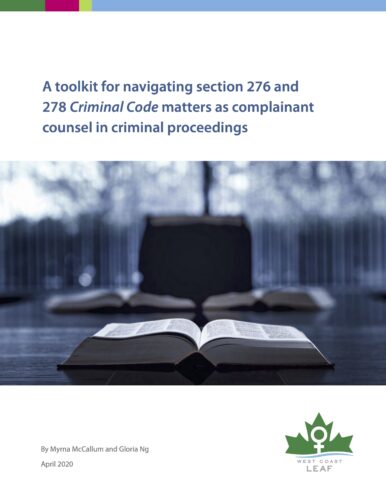
A toolkit for navigating section 276 and 278 Criminal Code matters as complainant counsel in criminal proceedings
For survivors of sexual assault navigating the criminal legal system, the disclosure of private records and introduction of evidence about their sexual history can be a devastating intrusion. Concerns about this type of intrusion can also be a major barrier to reporting sexual assault or accessing counselling and other support services.
In March 2020, as part of our Dismantling the Barriers to Reporting Sexual Assault project with the YWCA Metro Vancouver, West Coast LEAF produced a toolkit for navigating section 276 and 278 Criminal Code matters as complainant counsel in criminal proceedings. The toolkit sets out the law surrounding the admissibility of evidence of a survivor’s sexual activity and the production of third-party records. It also provides an overview of the evolution of this area of law, practical advice for advancing these types of cases, and guidance on developing a trauma-informed practice.
This toolkit is grounded in the findings from our 2018 report We Are Here: Women’s Experiences of the Barriers to Reporting Sexual Assault. In this report, we heard from survivors that the lack of training for justice system actors was a significant barrier to reporting sexual assault. The experiences shared in the report demonstrated the ways in which myths and stereotypes continue to permeate the legal system and undermine survivors’ safety, confidentiality, and access to justice.
While many survivors do not pursue justice and healing through the Canadian criminal justice system, those who choose to report sexual assault must receive the highest standard of legal representation, particularly when it comes to their right to privacy.
Download the toolkit (PDF, 2MB).
We are grateful to Myrna McCallum and Gloria Ng who authored this work.
The beautiful photographs in this toolkit are by Ava Neue, Division 7 Studio.
Webinar
In partnership with Courthouse Libraries BC, we offered a webinar on this resource in May 2020. An archived resource of the slides used in the webinar are available here.
This project has been supported by Women and Gender Equality Canada, and the Social Sciences and Humanities Research Council of Canada, iMPACTS: Collaborations to Address Sexual Violence on Campus; Social Sciences and Humanities Research Council of Canada.


